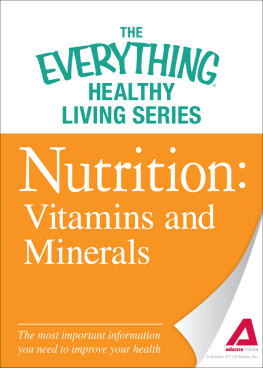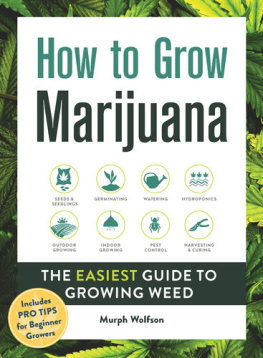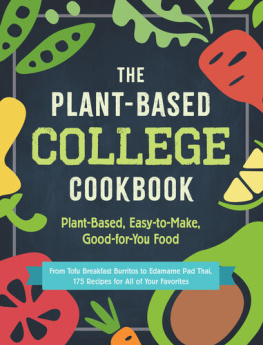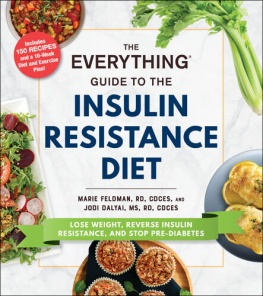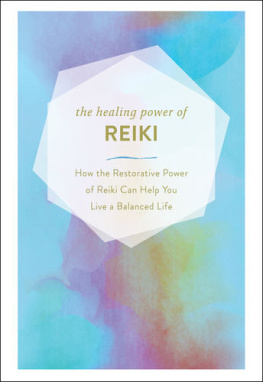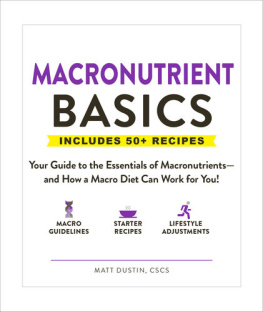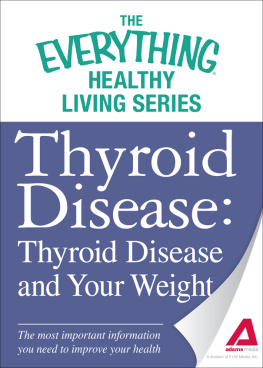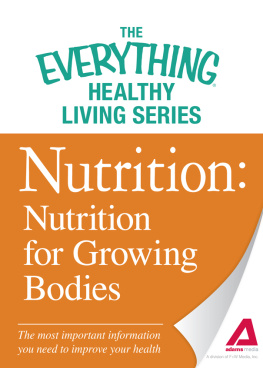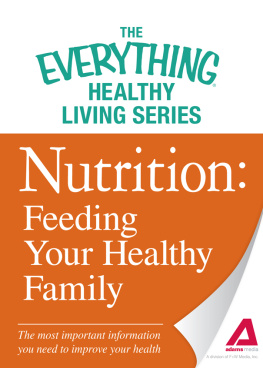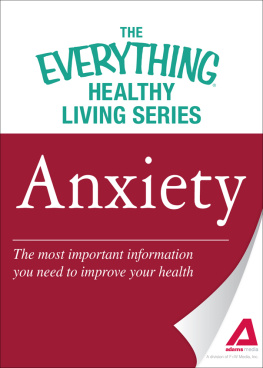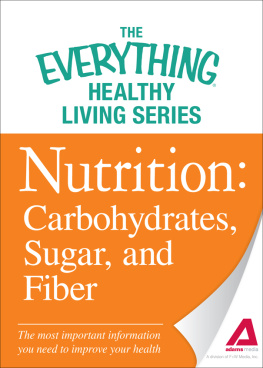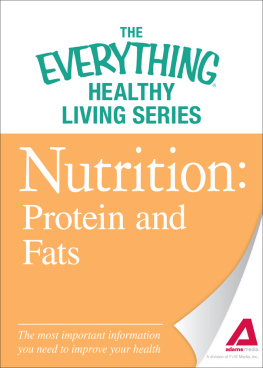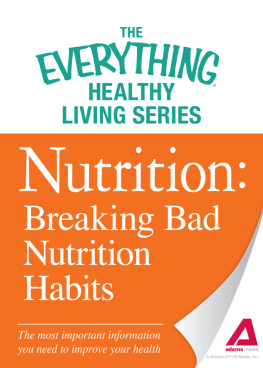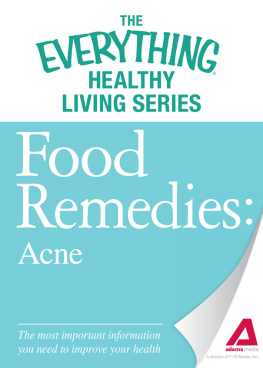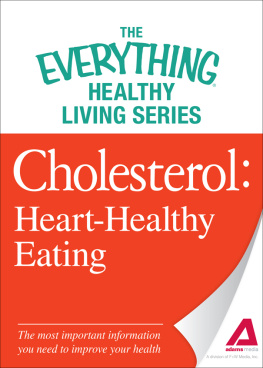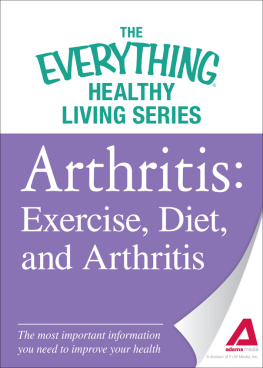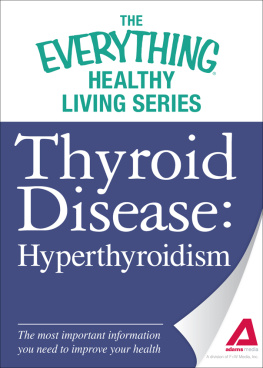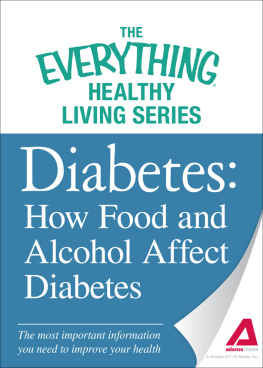Adams Media, an imprint of Simon & Schuster, Inc.
For more than 10 years, millions of readers have trusted the bestselling Everything series for expert advice and important information on health topics ranging from pregnancy and postpartum care to heart health, anxiety, and diabetes. Packed with the most recent, up-to-date data, Everything health guides help you get the right diagnosis, choose the best doctor, and find the treatment options that work for you.
The Everything Healthy Living Series books are concise guides, focusing on only the essential information you need. Whether youre looking for an overview of traditional and alternative migraine treatments, advice on starting a heart-healthy lifestyle, or suggestions for finding the right medical team, theres an Everything Healthy Living Book for you.
Nutrition
Food is everywhere. Every street has a restaurant, every event has a concession stand, and every commercial is dripping with cheese. Billboards, newspapers, and the Internet are constantly trying to sell you food. And you want to buy it. But is whats out there really something you need? Does it do your body any good? Is it making you healthy and strong? And what about the kids? How are they handling being inundated with constant food opportunities? Are they growing up healthy, lean, and fit? If they live in America, theres a good chance they arent.
Poor nutrition is a growing problem in the United States. Its not that we dont have enough to eat. Its that we have too much of the wrong stuff to eat. You probably already know you should lay off the fast food and pick up an apple instead of that doughnut. But have you ever wondered what healthier foods could really do for you?
Did you know that eating the right carbohydrates can give you ongoing energy? Did you know that bright fruits and vegetables can help protect you against cancer? Did you know that eating right at an early age can protect kids from food allergies?
Food is fuel. It can be delicious fuel, but it can also be the wrong fuel. Like putting diesel fuel in a gasoline engine, people often choose the wrong food. Without the proper fuel and regular intervals throughout the day, you sputter and stall and will likely need a tuneup, or worse, a complete overhaul. Getting the right fuel is not mysterious, difficult, expensive, or time-consuming. The Everything Healthy Living Series: Nutrition will show you exactly what, when, and how much you need to eat to get back on the road to good health.
Focusing on lifestyle changes instead of following a specific diet is the ticket to achieving optimal health, decreasing your risk of illness, increasing your energy level, improving your quality of life and well-being, and reducing your medications. In this series, youll find everything you need to know to get your family on the road to life-long good health.
If youd like to learn more about nutrition, check out The Everything Guide to Nutrition, available in print (978-1-4405-1030-4) and eBook (978-1-4405-1159-2) formats.
All about Vitamins and Minerals
The sources of vitamins and minerals can be confusing when choosing among fruits, vegetables, grains, proteins, dairy, fortified foods, and supplements. All vitamin and mineral amounts vary, so you must consume a variety of foods to maintain balanced nutrition. Its best to stay as close as you can to the mainstream of natural foods in order to meet your vitamin and mineral needs. Unfortunately, the modern individuals diet doesnt always provide the correct amount of vitamins and minerals she needs for optimal health and so some basic supplementation is often beneficial.
The Importance of Daily Vitamin Intake
Vitamins are a necessary component of a healthy diet. They are considered essential nutrients because our bodies either do not make them, or do not make enough of them. They are essential for normal body functions cell growth, blood cell production, hormone and enzyme synthesis, energy metabolism, and proper functioning of body systems, including the immune system, nervous system, circulatory system, and reproductive system.
Because no single food contains all the vitamins you need, you must obtain them through a variety of foods. You can take a pill that contains vitamins, but it is always preferable to get them the natural way. The reason is twofold. If you take a supplement because you assume your diet is poor, you may not be supplementing the right nutrients. More importantly, getting your vitamins by eating healthy foods provides the body with many other nutrients necessary for good health, including fiber, carbohydrates, protein, and water.
Fat-Soluble Vitamins
Four of the essential vitamins are fat soluble. That means that they dissolve in fat, not water, and are stored in the bodys fatty tissue and in the liver. Because they can be stored for long periods of time, people consuming a well-balanced diet do not need to supplement them. In fact, because these vitamins hang around for quite a while, they are more prone to toxicity than the water-soluble vitamins.
A normal amount of fat in the diet is necessary to metabolize these fat-soluble vitamins. They are absorbed through the large intestine, and there must be some fat present for successful absorption. After absorption, these vitamins are stored in the liver until needed.
Vitamin A
Also known as retinol, vitamin A is primarily found in animal foods, including dairy products, fish, liver, and egg yolks. It has a pro-vitamin, called beta-carotene, which is found in vegetables with orange pigment, such as carrots, sweet potatoes, and apricots, as well as some dark, leafy greens including spinach and kale.
Vitamin A is important for the health of your eyes. It is vital for night vision and the adjustments the eye regularly makes to various light levels. Vitamin A also helps keep skin healthy, promotes healthy bone and tooth growth, and is vital for proper cell division and reproduction. It strengthens and moistens mucous membranes, too, which helps you resist infections.
Essential
A pro-vitamin is not a vitamin that has renounced its amateur status. Also known as a vitamin precursor, pro-vitamins are organic compounds that, once ingested, the body converts into a vitamin.
Deficiencies are rare, but symptoms may include night blindness and seriously dry and itchy skin, as well as slow tooth and bone growth. Signs of vitamin A toxicity include dry itchy skin, nausea, and headache. Excessive amounts of beta-carotene in the body may turn skin a pale orange.
Vitamin D
Because it is naturally synthesized by sunlight on your skin, vitamin D is sometimes called the sunshine vitamin. Ten minutes in the sun is enough to give you your daily dose. During the Industrial Revolution, when people began spending more time indoors, and the skies were clouded by pollutants, rickets was rampant. Rickets is a disease in which bones do not harden properly. Scientists suspected a dietary deficiency along the same lines as scurvy, and soon found that cod liver oil eliminated the disease. It was also noted that large doses of sunshine were restorative.

